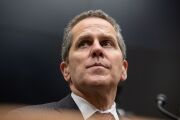
The Federal Reserve Board of Governors is poised to cast an initial vote on proposed
Powell testified in front of the House Financial Services Committee on Wednesday in the first of what will be two congressional appearances this week. The hearing was convened for Powell to deliver the Fed's semiannual monetary policy report, but issues of
Powell said no proposal has been put before the board yet and he declined to say whether he felt changes to capital rules were necessary. But, he said, some level of
"There's broad agreement … that capital is strong, and, you know, the question there will be, what sorts of increases will be justified. That's what we'll be looking at," he said. "The other thing is to point out the trade-off [of] higher capital. You know, the benefit of it, of course, is to have stronger banks that can lend and maybe survive in more kinds of crisis environments. But, you know, there are costs as well. … It's going to be as always a question of weighing and balancing those costs."
Powell confirmed that an initial proposal on regulatory changes was likely to be put before the full Board of Governors this summer. He noted that the vote, as is customary, will take place behind closed doors, adding that such a meeting might have to be held virtually to accommodate board members' travel arrangements.
During the hearing, numerous committee members — primarily Republicans — expressed concerns about potential capital changes being too burdensome on smaller institutions, particularly community and regional banks that have already seen their business models stressed by rapidly rising interest rates. Several also cited recent news reports that large banks could see their capital obligations increase by 20%, and voiced concerns about a potential dampening effect on credit conditions.
"Our already well-capitalized banks withstood the COVID shock and severe Fed stress tests as the economy is facing headwinds from the Fed's own rapid rate hikes," Rep. Andy Barr, R-Ky., said during the hearing. "Now is not the time to be engineering massive new regulatory changes or hindering regional banks, which have already been under stress."
Powell said small and community banks will not see their capital requirements changed.
He added that any changes to capital rules would be put through a 90-day notice and comment rulemaking period, which would be followed by an extensive process for considering that feedback. He also noted that other bank regulatory agencies would have to be engaged, lengthening the process even further. Then, he noted, any changes that were advanced would be phased in over time.
"Whereas interest rates, for example, have immediate effects on financial conditions, reasonably quick effects on economic conditions, capital requirements have much more sort of medium-term, longer-term effect," Powell said.
Several
Powell said the process for crafting new policies is being conducted in accordance with the vice chair for supervision's authorities, as laid out in the Dodd-Frank Act of 2010. He said he and other governors have been briefed by supervisory staff about potential proposals and noted that nothing will go into effect without a majority vote by the Board.
Some Democrats also seized on the findings from Barr's report. Rep. Nydia Velazquez, D-N.Y., picked up on the finding that a cultural shift in supervision took place under Barr's predecessor, Randal Quarles.
"According to the report, this shift included pressure to reduce burdens on firms, meet a higher burden of proof for a supervisory conclusion and a need to accumulate more evidence than in the past," Velazquez said.
She pressed Powell on whether he observed this change, too, and if he ever broached the subject with Quarles at the time.
"The way you're describing it is not what I recall," Powell said. "I recall Vice Chair Quarles talking about things like focusing on the really important issues and not getting diverted."
But, Powell added, that he did not refute the findings outright, saying the staffers who conducted the review likely "reported accurately what they heard." He also noted that changes in supervisory practices and approaches are fully within Vice Chair Barr's discretion and that he anticipated some changes in the months and years ahead.
Powell also faced several questions about the
Rep. Mike Flood, R-Neb., asked about the Fed's plans for shrinking its holdings and preventing the balance sheet from growing unwieldy in the years ahead.
"My concern, Chairman Powell, is that efforts to shed assets from the Fed's balance sheet have never been anywhere as quick as efforts to build it back up," Flood said. "Our economic cycle does go through recessions from time to time. It's not always boom, but sometimes bust, too. If we continue a pattern of rapidly building up the Federal Reserve's balance sheet in bad times, and slowly shedding assets in good times, we're going to see the balance sheet grow significantly over time."
Powell said he shares this concern and noted that the Fed is allowing assets to roll off at a faster pace — roughly $90 billion worth of mortgage-backed securities and Treasuries monthly — than during the last reduction campaign that lasted from 2017 to 2019.
Powell said the Fed does not have
"Demand for reserves can be volatile, and you don't want to find yourself, as we did a few years back, suddenly finding reserves were scarce, even though we didn't see it coming. We then had to put more reserves into the system at a time when we didn't want to be doing that," he said. "So, I think you want to have a level of ample reserves plus a buffer. And you know, that'll be a percent of GDP that we get down to, and we're moving in that direction pretty smartly."







